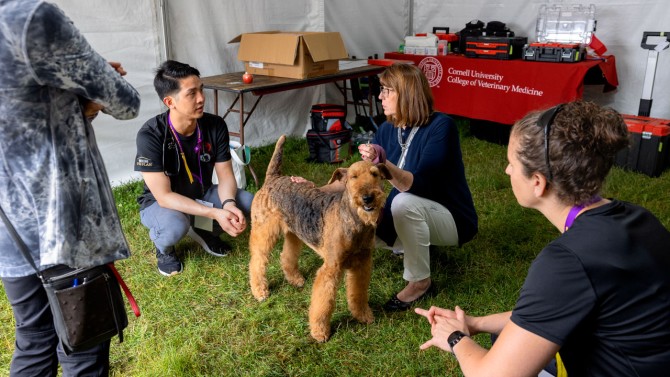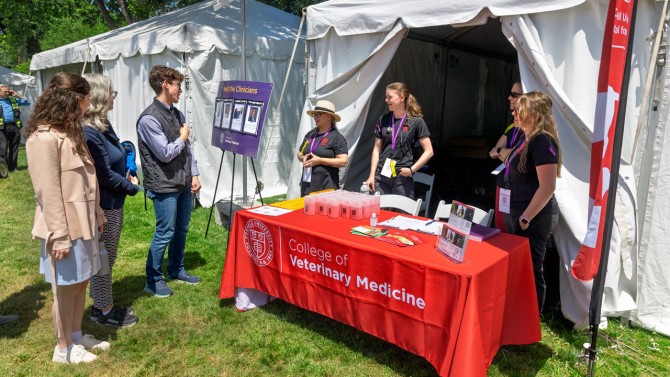Lisa Mitchell, a licensed veterinary technician with the College of Veterinary Medicine, brought her 7-year-old golden retriever, Rook, to compete at this year’s Westminster Kennel Club Dog Show, where CVM representatives provided on-site care for the elite breeds.
Golden retriever – and Cornell vets – bring top skills to Westminster
By David Nutt, Cornell Chronicle
TARRYTOWN, NEW YORK – As he waited for his first competition to begin, contestant No. 22 seemed relaxed and in good spirits. The previous evening, he had been a little nervous in his hotel room, but he wasn’t showing any pre-game jitters now. He had come to the event prepared, with bottled water and snacks (string cheese, sliced meatballs) and size-appropriate articles for competing (gloves, dumbbells) as well as his beloved tennis ball, although there wasn’t a tennis court in sight. As his trainer noted earlier: “They can be very tennis ball crazy.”
He only barked once, when a nosy interviewer entered his personal space.
Otherwise, the 7-year-old golden retriever sat calmly in his soft travel crate, completely unfazed by his first appearance at the Westminster Kennel Club Dog Show – held June 18-22 in Tarrytown, New York – where the competition is always fierce, and extra fluffy.
“We’re just here to have fun and do the best we can,” said Rook’s owner and trainer, Lisa Mitchell, a licensed veterinary technician with Cornell’s College of Veterinary Medicine (CVM). “We’re going to go in the ring and have a good time. I’m going to laugh with him and play with him, and not get too stressed about it. If I get too stressy, then he gets stressy.”
Mitchell came to Westminster both as a trainer and in her professional capacity with CVM. For the last four years, the college and its Stamford, Connecticut-based satellite clinic, Cornell University Veterinary Specialists (CUVS), have been the official providers of on-site care at the annual event. The veterinary activities can range from performing wellness exams to treating broken toenails, nausea, digestive issues and other common show-dog ailments, as well as referring more serious cases to emergency facilities.
By the end of the day, Rook had run, heeled, sat, stayed, leapt a high bar and a barrier, and retrieved his articles by identifying Mitchell’s scent, as part of the dog show’s seventh annual Masters Obedience Championship. He ultimately racked up 194 out of 200 points and received a green qualifying ribbon in the obedience utility class. He didn’t fare as well in the obedience open class, failing to qualify after briefly stepping on a flat board before vaulting over it.
“That’s how these things go,” Mitchell said afterwards. “I’m still happy for him. He’s still my best dog. And I’ve had a ball. Coming to Westminster was one of those things I wanted to check off my bucket list. So now I have, and it lived up to its hype.”
‘These dogs are pets first’
Among the dogs that received veterinary attention on the sprawling grounds of Tarrytown’s Lyndhurst mansion this year were an Airedale terrier that was having trouble eating and a Pomeranian that somehow managed to get string cheese in its eye.
Trevor Chan, DVM ‘20, a resident in emergency and critical care at CUVS, examined the Airedale terrier and gave her owners some tips to help her regain her appetite, plus some specific symptoms to monitor.
Coming to Westminster is an opportunity for Cornell to provide a valuable service for the most elite dogs in the country, but it’s also a way for students and residents to burnish their skills in the field.
“I learn a lot from not having the strength of the full hospital behind me and just relying on physical exam skills and making sure that I am not relying too heavily on diagnostics,” Chan said. “It’s important to glean as much as I can from that.”
While dogs posed in the ring and spectators cheered from the sidelines, the Cornell team handed out cooling towels and provided information about the university’s veterinary services to visitors who stopped by the tent.
“It’s a privilege that they trust us and our skills to represent Cornell and provide the best veterinary care we can for the best dogs in the country right now,” said Dr. Elisa Mazzaferro, staff criticalist at CUVS and an adjunct associate clinical faculty of emergency critical care at CVM. “These dogs are pets first.”
Westminster itself provides a kind of educational service, helping members of the general public learn about different breeds and determine which might be a good fit for their households, Mazzaferro said.
There are also the fringe benefits of waiting on hand and foot – and paw – for any of the nearly 3,500 dogs that come to Westminster each year – the glamorously coiffed, the athletically accomplished – all of them basking in the limelight and upstaging their humans at every turn. At least when they aren’t busy sitting in the shade with portable fans.
“As an emergency critical care clinician, I rarely have the opportunity to see healthy dogs,” Mazzaferro said. “And so I love it here because I get to pet, kiss and make friends with a lot of healthy dogs that come to visit.”
There is also the occasional human who could use a little assistance.
“Last year a junior handler dropped a crate on her foot and needed sutures. She was just getting ready to go into the show ring,” Mazzaferro said. “So I scrubbed her up and we gave her royal blue bandage material to match her dress.”
‘Can I get better? Where can we improve?’
For Mitchell, her experience as an LVT has benefited her dog training, giving her insights into animal behavior and maintaining proper canine health – and vice versa.
“We do a lot of training steps [at CVM]. You can learn how to get a dog to sit really quickly with a piece of food. That comes from training,” she said. “Sometimes I try to teach people how to do it, so that helps in an office setting.”
A native of Trumansburg, New York, Mitchell came to CVM in 1982 for a summer internship following her graduation from SUNY Delhi. At the recommendation of a clinician, she applied for a job in the operating room of what is now CVM’s Nemo Farm Animal Hospital. After eight years there, she moved to the Equine Performance Clinic, where she has worked ever since.
“I grew up on a dairy farm,” she said. “Horses and dogs go together.”
Mitchell got her first purebred dog, a golden retriever puppy named Lancer, in the early 1990s. She took him to a basic obedience class and they both enjoyed it so much, they continued on to the next level class, then the next. Soon they began entering competitions, which, in addition to the thrill of sport, offered community and camaraderie with fellow trainers and handlers.
“I get a social aspect out of it,” Mitchell said, “and the knowledge that my dog is earning titles, and those titles will always be on his record. Anybody can look up Lancer and see all the titles that he earned. And it’s fun. I really enjoy training. The showing goes hand in hand with that. Can I get better? Where can we improve?”
Over the last three decades, Mitchell has raised golden retrievers and Bernese mountain dogs, for a total of eight titled dogs – all of whom have had “medieval, King Arthur-y” themed names.
In 2015, Mitchell was recovering from cancer when she made a decision.
“I hadn’t had a golden retriever puppy in 15 years, maybe more,” she said. “So I said ‘I’m gonna get myself a golden retriever puppy as my reward for getting through my treatment.’”
She made a number of inquiries and ultimately found a breeder in Dayton, Ohio, who had a new litter. Mitchell had hoped for a male, and there was one available – but she was second in line for it. When the person who had first pick declined to take the pup, Mitchell snapped him up, without having ever met the dog or his sire’s owner.
“I brought him home and started training him. And he was just a joy. My partner calls him Goody Two Shoes, because he never really did bad puppy things. He didn’t chew up a lot of stuff,” Mitchell said. “You would tell him one time not to do something and he’d be like, ‘Oh, you don’t want me to do this? You want me to do it that way? OK.’ And he’s very consistent. He’s had a few little glitches along the way, but nothing that we haven’t been able to iron out. He’s a special dog. Who knows if I’ll ever, ever have another pup like this? He’s just sort of amazing to me.”
Together, they have traveled to obedience competitions across the country, from Seattle to Long Beach to Houston to Florida. Mitchell considers Rook – whose registered name is officially OTCH Twincreek’s Chess Master at Witrin UDX4 OM5 BN RE AX AXJ – to be the beneficiary of all the training she has put into her previous dogs, all the mistakes she’s learned from, all the expertise she’s amassed. As a result, Rook is her first dog to compete at Westminster – an honor that initially caught Mitchell off guard. The nation’s top 200 dogs are invited to apply to compete in the obedience championship, and only 25 are admitted. Mitchell hadn’t realized just how high Rook was ranked until the invitation came.
Rook is still in his sporting prime, Mitchell said, with several more years of competition ahead of him. She and her partner also have two other golden retrievers and a Bernese mountain dog at home.
“We keep it fun for them and they’re enjoying it,” she said. “The day he stops having fun or starts getting like ‘I don’t like this anymore’ is the day we will stop and do something else.”
As much as she has trained Rook, Mitchell says he has shown her a thing or two, as well.
“Rook has taught me to be humble,” she said with a laugh. “They all teach you to be humble. Don’t let your head get too big. And just enjoy the ride. He has taken me places I never thought I would go in the obedience competition world. I’m just going to enjoy it for as long as I can and know that my next dog won’t be as easy. I have to remember that.”
Media Contact
Get Cornell news delivered right to your inbox.
Subscribe


